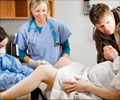Q: Which doctor should I consult for obstetric fistula?
A: An obstetrician and gynecologist can be consulted for obstetric fistula. A surgeon can help repair the fistula surgically.
Q: Why is obstetric fistula more prevalent in under-developed countries?
A: Obstetric fistula occurs due to prolonged unattended labor especially in countries where early marriages are prevalent. Inadequate medical care, expertise and infrastructure are the major contributing factors of obstetric fistula in under-developed countries.
Q: Is obstetric fistula a treatable condition?
A: Yes. Obstetric fistula can be prevented and also can be treated. A simple vaginal surgery is usually the solution for the closure of the fistula. Sometimes, other complications may hinder the complete repair or healing of the fistula.
Q: What are the challenges faced with regards to treatment of obstetric fistula?
A: Due to the socio-economic conditions of the countries and regions where obstetric fistula is prevalent, many challenges are faced by the medical expertise and care givers regarding the prevention and treatment of obstetric fistula. These challenges include:
- High number of women in need of the reconstructive surgery for fistula
- Lack of access to trained surgeons and medical facilities
- For many women (or families), the surgery is unaffordable
- Lack of information and education among women and midwives
- Most women go into hiding because of the shame and embarrassment it causes
- Many women believe that the condition is not treatable
Q: What is the action being taken worldwide for this preventable tragedy?
A: Various organizations come forward to help out the under-developed countries deal with this tragedy. Obstetric Fistula Working Group (OFWG) is an official international partnership formed by the Campaign to End Fistula along with organizations to coordinate and collaborate global efforts to eliminate obstetric fistula. These organizations include:
- Addis Ababa Fistula Hospital in Ethiopia
- World Health Organization (WHO)
- The United Nations Population Fund (UNFPA)
- Columbia University’s Averting Maternal Death and Disability Program (AMDD)
- International Federation of Gynecology and Obstetrics (FIGO)









